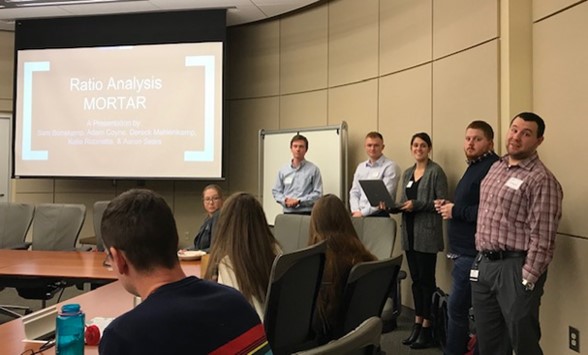ACCT 415: Accounting for the Greater Good

Faculty: Tim Miller
For the past three years, Professor Tim Miller’s ACCT 415, Nonprofit & Government Accounting, has leveraged community partnerships made through the Eigel Center to provide students with opportunities to apply what they are learning in the classroom and equally benefit nonprofit partners by providing a tangible, important service.
Miller’s course introduces students to financial reporting for governmental and not-for-profit organizations. As an integral part of the class, students collaborate with local nonprofits to offer ratio benchmarking and an analysis on the organization’s IRS form 990 – a service that most organizations cannot afford but is highly useful for accurate reporting. In previous semesters, students visited with their partner to learn more about their mission, volunteered or attended an event, and worked directly with leadership to analyze and present their recommendations. This year on-site visits were guided by community protocols due to COVID-19, however most of Miller’s students were still able to engage with the organizations, learn about their mission and impact through a one-page summary, and some groups still were able to engage in person following University protocols.
The results of the students’ semester long service work are typically presented in person, but will likely be moved to an online format this year. In past presentations, nonprofit directors, staff, and board members have attended and queried each student group about their analysis and how it may affect their organizational and fiscal health. Miller’s students engage tough questions, provide insights, and suggest possible improvements for each partner. The service the students provide is a tangible, significant opportunity for many grassroots nonprofits with limited resources and is synergistic with any annual auditing work.
Since integrating service learning into his course in 2018, Miller’s students have worked with over 12 nonprofit organizations in Greater Cincinnati. He notes that he is motivated to continue this work after receiving student feedback from previous years where students explicitly enjoyed working with the nonprofit firms rather than just memorizing course material. Last year he reflected:
“My students gain a deeper understanding of (nonprofit) accounting and an appreciation that they can use their accounting skills to go out and help nonprofits do better on the financial side right from the start.”